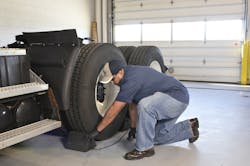The term “wheel-off” refers to an incident in which a wheel dismounts from a vehicle while it is in operation. This can be caused from loose lug nuts, bearing failure at the spindle, improper torque on the lug nuts, rusted or damaged lug nuts, threads, or studs, or improper installation and inspection procedures. Wheel-offs are extremely dangerous and have resulted in devastating accidents, damages, and loss. To help mitigate wheel-off instances, it is imperative to follow standard operating procedures (SOPs) when installing and servicing commercial vehicle wheels.
Updating standard operating procedures
Dan Flanagan, vice president of maintenance for Bulkmatic Transport, has implemented an installation and inspection procedure, in addition to Technology and Maintenance Council’s recommended SOP, with company technicians. This initiative minimizes the risk of wheel-offs and helps to ensure the safety of Bulkmatic’s drivers and the public motorists with which they share the road. Bulkmatic is headquartered in Griffith, Indiana, and has 55 terminal locations across North America with more than 550 tractors and over 1,500 dry bulk trailers.
Bulkmatic, like many fleets, has had instances of loose wheels and even wheel-offs. Flanagan spoke to the struggle of ensuring that technicians and vendors were doing their part to confirm the wheels and spindle nuts were properly installed and torqued each and every time a wheel was serviced. Technicians can face many distractions in a shop from incoming and outgoing drivers, dispatch, shop managers, and the workload of simultaneous services.
Whatever the case may be, the reality is a technician may lose track on their progress of their wheel service and miss important steps and procedures. Flanagan wanted to eliminate this risk and came up with a customized SOP for wheel service.
Flanagan served in the U. S. Marine Corps for 21 years as a crew member involved in the repair process of jet fighter aircraft. He spoke to the SOP of aircraft repair and how it had influenced the SOP implemented for Bulkmatic’s wheel servicing.
“When our aircraft were repaired, it was required that a collateral duty inspector (CDI) inspect the repair,” Flanagan says. “If the repair involved a flight control item, a quality assurance representative (QAR) would observe and inspect the repair. We are using a similar process, requiring a ‘certified observer’ to witness the critical process of the installation of the spindle nut and wheel lug nuts. The QAR level [of service inspection] is the level we need to be [at] with wheel and hub installation.”
According to Flanagan, this SOP helps fill in the gaps that standard SOPs may overlook. A second pair of trained and certified eyes is verifying that the process is being performed properly. The “certified observer” – who could be another technician in the shop, a dispatcher, or even a terminal manager – receives the same training and certifications as the technicians completing the service in order to thoroughly ensure that the verification is sufficient.
The SOP requires a certified observer be present throughout the process of spindle nut and wheel installations. If a certified observer is unavailable, the service is halted and only continues when a certified observer is able to verify the installation process. Flanagan notes that this piece of the procedure has caused some delays, but he values the safety assurance over the loss in uptime.
The SOP also calls for a torque check of every wheel lug nut during each preventive maintenance (PM) procedure, which is scheduled in 60-day intervals for Bulkmatic.
This SOP goes beyond Bulkmatic’s own vehicles and technicians. If a vendor installs wheels on Bulkmatic property, they too are subject to the SOP and must have a certified observer witness the lug nut torqueing process, as well as sign off on the service procedures. The SOP also calls for wheel torque measurements to be entered into Bulkmatic’s maintenance system in order to verify over-the-road installs upon the vehicle’s return to a Bulkmatic location.
Bulkmatic has also made the transition from using wheel lug arrows to Zafety Lug Locks on their vehicles. As the arrows would indicate whether a lug nut has moved or not, the Zafety Lug Locks are designed to prevent the lug nuts from moving whatsoever. Additionally, the lug nut torque can still be checked at the time of PM with the Zafety Lug Locks installed.
Furthermore, Bulkmatic has implemented a weekly report to alert the maintenance group at the corporate level, as well as regional maintenance managers, when a vehicle has undergone PM at a vendor location more than once. If such a vehicle has not returned to a Bulkmatic location for PM, an alert is sent to the team’s dispatch group to signal that the vehicle should return for in-house PM.
“We want to be able to personally check over our equipment between vendor PM’s or repairs,” Flanagan says.
Feedback regarding the new SOP
Flanagan initiated the new process in March of 2019 after having each technician individually trained and sign off on the new SOP. One of the challenges Flanagan has faced with the implementation of this new SOP was the increased time it takes to complete the procedure. To address this, technicians requested that standard repair times (SRTs) be adjusted to account for the additional time. Bulkmatic adjusted its SRTs and has fully implemented the procedures.
Flanagan mentioned Bulkmatic has had some push back from certain vendors, who are now required to uphold the new SOP on Bulkmatic property. However, he and Bulkmatic were also applauded by other vendors for taking a major step forward in promoting safety.
With the new process in place, mis-torqued lug nuts have been caught and rectified before any wheel-off instances were able to take place. Flanagan claims that of the vehicles that have been checked under the new SOP at the time of PM, only lug nuts installed by one of the company’s vendors have been mis-torqued.
The new SOP seems to be working, as vehicles serviced in-house and on company property have been wheel-off incident-free since the new procedures have been in place.
“Our ultimate goal is to never have a wheel prematurely leave a vehicle,” Flanagan says. “We will continue to test and tweak our SOPs to ensure we stay on top of any other means to possibly make our equipment the safest on the road [in order] to ensure public safety.”
About the Author
Tyler Fussner
Associate Editor | Fleet Maintenance
Tyler Fussner is Managing Editor - Community Manager at Supply Chain Connect, part of the Design & Engineering Group at Endeavor Business Media.
Previously, Fussner served as the Associate Editor for Fleet Maintenance magazine. As part of Endeavor's Commercial Vehicle Group, his work has been published in FleetOwner magazine, as well as Bulk Transporter, Refrigerated Transporter, and Trailer-Body Builders.
Fussner's May 2022 print feature 'The dawn of hydrogen trucks' was named the best single technology article in B2B by the judges of the 2022 Folio: Eddie and Ozzie Awards. Fussner was also awarded Silver in the Technical Article category for the Trade Association Business Publications International (TABPI) 2021 Tabbie Awards.
Fussner previously served as Assistant Editor for Endeavor's Transportation Group on the PTEN, Professional Distributor, and VehicleServicePros.com brands.
Fussner studied professional writing and publishing at the University of Wisconsin-Whitewater. He has experience in shop operations, is a Michelin Certified Tire Technician, and a Michelin Certified Tire Salesperson.

